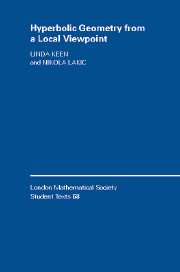Book contents
- Frontmatter
- Contents
- Introduction
- 1 Elementary transformations of the Euclidean plane and the Riemann sphere
- 2 Hyperbolic metric in the unit disk
- 3 Holomorphic functions
- 4 Topology and uniformization
- 5 Discontinuous groups
- 6 Fuchsian groups
- 7 The hyperbolic metric for arbitrary domains
- 8 The Kobayashi metric
- 9 The Carathéodory pseudo-metric
- 10 Inclusion mappings and contraction properties
- 11 Applications I: forward random holomorphic iteration
- 12 Applications II: backward random iteration
- 13 Applications III: limit functions
- 14 Estimating hyperbolic densities
- 15 Uniformly perfect domains
- 16 Appendix: a brief survey of elliptic functions
- Bibliography
- Index
13 - Applications III: limit functions
Published online by Cambridge University Press: 13 January 2010
- Frontmatter
- Contents
- Introduction
- 1 Elementary transformations of the Euclidean plane and the Riemann sphere
- 2 Hyperbolic metric in the unit disk
- 3 Holomorphic functions
- 4 Topology and uniformization
- 5 Discontinuous groups
- 6 Fuchsian groups
- 7 The hyperbolic metric for arbitrary domains
- 8 The Kobayashi metric
- 9 The Carathéodory pseudo-metric
- 10 Inclusion mappings and contraction properties
- 11 Applications I: forward random holomorphic iteration
- 12 Applications II: backward random iteration
- 13 Applications III: limit functions
- 14 Estimating hyperbolic densities
- 15 Uniformly perfect domains
- 16 Appendix: a brief survey of elliptic functions
- Bibliography
- Index
Summary
In this chapter we look at non-compact subdomains of the unit disk and show that, even if they are degenerate (Bloch), there are iterated function systems with more than one constant limit function.
We then show that, if the subdomain is non-Bloch, there are iterated function systems with non-constant limits and that, in fact, any function may be realized as the limit of an iterated function system.
By the Riemann mapping theorem and Theorem 12.3.1 the results in this chapter hold for subdomains of any simply connected hyperbolic domain.
Uniqueness of limits
In this section we show that for any integer n > 1, and any non-relatively-compact subdomain X ⊂ Δ, there is an iterated function system that has n arbitrarily chosen distinct accumulation points. We prove
Theorem 13.1.1Let X be any subdomain of Δ that is not relatively compact and let c0, c1, …, cn−1be n distinct points in X. There is an iterated function system that has at least n distinct accumulation points G0, G1, …, Gn−1 and Gi(0) = ci, i = 0, …, n − 1. If X is Bloch these accumulation points are constant and there are no other accumulation points.
The key lemma
In this section we prove a lemma that is the crux of the proof of Theorem 13.1.1.
Lemma 13.1.1Let X be any non-relatively-compact subset of Δ, and, for any fixed n, let a1, …, anbe any distinct points in Δ\{0}. Then there exist a degree-(n − 1) rational function f : Δ→Δ and points x1, …, xn ∈ X such that, for all i = 1, …, n, f(xi) = ai/xi.
- Type
- Chapter
- Information
- Hyperbolic Geometry from a Local Viewpoint , pp. 201 - 218Publisher: Cambridge University PressPrint publication year: 2007



